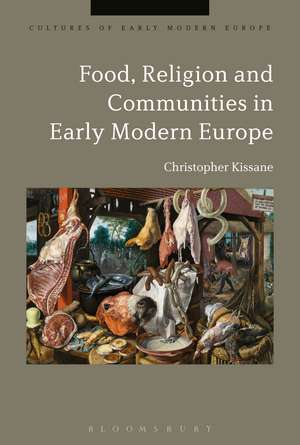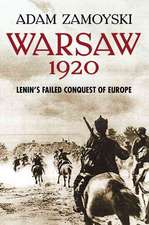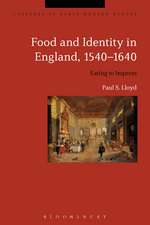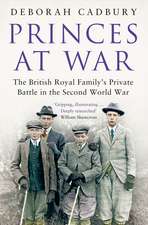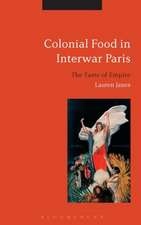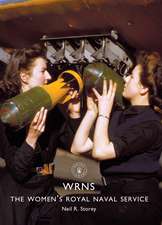Food, Religion and Communities in Early Modern Europe: Cultures of Early Modern Europe
Autor Dr Christopher Kissaneen Limba Engleză Paperback – 25 dec 2019
| Toate formatele și edițiile | Preț | Express |
|---|---|---|
| Paperback (1) | 230.69 lei 6-8 săpt. | |
| Bloomsbury Publishing – 25 dec 2019 | 230.69 lei 6-8 săpt. | |
| Hardback (1) | 714.92 lei 6-8 săpt. | |
| Bloomsbury Publishing – 13 iun 2018 | 714.92 lei 6-8 săpt. |
Preț: 230.69 lei
Preț vechi: 297.02 lei
-22% Nou
Puncte Express: 346
Preț estimativ în valută:
44.15€ • 45.92$ • 36.95£
44.15€ • 45.92$ • 36.95£
Carte tipărită la comandă
Livrare economică 14-28 martie
Preluare comenzi: 021 569.72.76
Specificații
ISBN-13: 9781350143777
ISBN-10: 1350143774
Pagini: 240
Ilustrații: 23 bw illus
Dimensiuni: 156 x 234 x 11 mm
Greutate: 0.34 kg
Editura: Bloomsbury Publishing
Colecția Bloomsbury Academic
Seria Cultures of Early Modern Europe
Locul publicării:London, United Kingdom
ISBN-10: 1350143774
Pagini: 240
Ilustrații: 23 bw illus
Dimensiuni: 156 x 234 x 11 mm
Greutate: 0.34 kg
Editura: Bloomsbury Publishing
Colecția Bloomsbury Academic
Seria Cultures of Early Modern Europe
Locul publicării:London, United Kingdom
Caracteristici
Original approach that uses food history to understand the wider implications of the Inquisition, the Reformation and witchcraft in early modern Europe
Notă biografică
Christopher Kissane is Editorial Fellow at History Workshop and an Associate Research Fellow at Birkbeck, University of London, UK. He is also a BBC/AHRC New Generation Thinker.
Cuprins
List of FiguresList of TablesAcknowledgementsList of Abbreviations1. Introduction: Food and HistoryPart I - Food and Inquisition2. 'The Foods of a Christian': Food, Religion and Inquisition3. Kitchens and Neighbours: Food, Gender and Community in Inquisition CastilePart II - Food and Reformation4. 'The Eaters': Fast-Breaking Protest in Early Reformation Zürich5. 'Sausage-Makers and 'Cheese-Hunters': The Cultural Context of Fast-BreakingPart III - Food and Witchcraft6. Dining with Demons: Food, Witchcraft and Evil7. 'Plain Hunger and Necessity': Food, Fear and Community8. Conclusions: Thinking about Food, Thinking with FoodBibliographyIndex
Recenzii
This book will be useful to researchers interested in early modern European culture, and it is written in a style that is accessible to undergraduate students, rendering it amenable for classroom use, as well.
[A] wide-ranging and fascinating book that succeeds in providing new perspective on familiar events in European history. One of Kissane's key achievements is demonstrating the ways in which foods and food practices are constitutive and illustrative of religious and gender boundaries. This work is also highly readable and could easily be incorporated into undergraduate teaching.
[Provides] a compelling and readable analysis of the myriad ways in which it is near impossible to understand any aspect of human existence, lived religious beliefs included, without reference to the most fundamental of human activities: eating.
An engaging and informative book that introduces readers to the significant role of food in the social and cultural history of early modern Europe ... its greatest accomplishment is to show how food practices cast light on religion, community, and gender as they were woven into the ordinary daily activities of early modern Europeans. Its readable and engaging style will be of great value in the undergraduate classroom, while its sophistication and scope will appeal to advanced scholars.
The stories in this book, with their wealth of fascinating details, illuminate, with nuance, every aspect of the societies from which they come.
This elegantly written, thoughtfully structured book examines food's fundamental role in early modern religious belief, identity, and community.
Adds something new and very needed in European food history: more archivally researched individual cases to illuminate the great diversity of early modern European cultures.
Richly researched, forcefully argued, and provides ample 'food for thought' ... a welcome, and highly accessible, addition to the field of early modern food studies.
A highly imaginative account of food, faith and society in early modern Europe. Kissane offers a refreshing comparative discussion which is never broad-brushed but richly contextualised. Students will enjoy a stimulating read which makes us think in new ways about religion and culture in the period.
Here is some astounding storytelling: three separate episodes from Inquisition era Castile to Reformation Zurich to a witch hunt in Shetland, all three about food and women. This book fills so many gaps in the scholarship, is so beautifully written and thought provoking that I would recommend it for any early modern history class and anyone interested in the history of food and the history of women.
[A] wide-ranging and fascinating book that succeeds in providing new perspective on familiar events in European history. One of Kissane's key achievements is demonstrating the ways in which foods and food practices are constitutive and illustrative of religious and gender boundaries. This work is also highly readable and could easily be incorporated into undergraduate teaching.
[Provides] a compelling and readable analysis of the myriad ways in which it is near impossible to understand any aspect of human existence, lived religious beliefs included, without reference to the most fundamental of human activities: eating.
An engaging and informative book that introduces readers to the significant role of food in the social and cultural history of early modern Europe ... its greatest accomplishment is to show how food practices cast light on religion, community, and gender as they were woven into the ordinary daily activities of early modern Europeans. Its readable and engaging style will be of great value in the undergraduate classroom, while its sophistication and scope will appeal to advanced scholars.
The stories in this book, with their wealth of fascinating details, illuminate, with nuance, every aspect of the societies from which they come.
This elegantly written, thoughtfully structured book examines food's fundamental role in early modern religious belief, identity, and community.
Adds something new and very needed in European food history: more archivally researched individual cases to illuminate the great diversity of early modern European cultures.
Richly researched, forcefully argued, and provides ample 'food for thought' ... a welcome, and highly accessible, addition to the field of early modern food studies.
A highly imaginative account of food, faith and society in early modern Europe. Kissane offers a refreshing comparative discussion which is never broad-brushed but richly contextualised. Students will enjoy a stimulating read which makes us think in new ways about religion and culture in the period.
Here is some astounding storytelling: three separate episodes from Inquisition era Castile to Reformation Zurich to a witch hunt in Shetland, all three about food and women. This book fills so many gaps in the scholarship, is so beautifully written and thought provoking that I would recommend it for any early modern history class and anyone interested in the history of food and the history of women.
